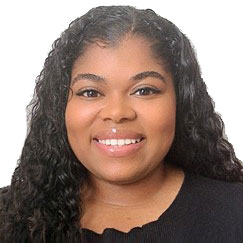It’s not just how I look, it’s how I sound too
Language is an important marker of racial identity and, sadly, another source of discrimination for black and ethnic minority communities

STRATEGY
Image: Istock

Leila Connage
Recruitment coordinator, Campbell Tickell
Recently, there have been plenty of conversations around race, diversity, and inequality. Conversations that I am glad are happening, because too often they are avoided as they are viewed as ‘uncomfortable’ topics to discuss.
I have heard many accounts of situations where individuals have felt the need to adapt themselves to avoid judgement or prejudice, so as not to come across as: ‘too young’, ‘too loud’, or sadly in some cases, ‘too black’.
We live in a world where many people go to school, university or work and feel the need to mask or dim their identity. For those of us who feel this way, there are many aspects of ourselves that we consciously try to adapt.
I have often been in environments where I am the only black person, or one of very few. I have felt the need to edit myself, i.e. make sure my hair isn’t too full or afro, in case I am seen to be ‘unprofessional’. I will make sure my naturally vibrant personality does not come across too bubbly – so I am not depicted as ‘loud’ and ‘unrefined’. Sometimes I have even thought, “do I need to speak differently too?”.
Language as identity
There are many different variables that come together to create our identity. Language and the way we speak can be an important aspect of racial identity. However, communication and language are mentioned less than appearance in relation to profiling and prejudice.
During lockdown I have been reflecting on my time at university, where I faced various instances of racial prejudice, assumptions and discrimination, based on the way I look and/or speak. I have both experienced and observed how the way people speak puts them into certain categories.
“Sounding white”
As part of a Language and Power module at university, my friend and I explored the connection between language and race. This seemingly controversial topic (according to my tutors) was titled: “Sounding white versus speaking fluently”.
The study aimed to discover what the phrase “sounding white” meant, since it was something we heard all too often. Is it an insult or a compliment? Does it refer to an accent, a tone of voice or how an individual articulates themselves?
The phrase “sounding white” is often seen as derogatory. Whether it is used by a white person towards a black person, or a black person towards another black person – it really does not matter.
Our study confirmed that when a black person is labelled as “sounding white”, it usually infers that they use ‘standard’ or ‘good’ English. Whereas “sounding black” holds negative connotations of broken or poor English, slang, hip-hop or other ‘sub’-cultures. This is often characterised as deficient or inferior, and in official studies, referred to as ‘verbal deprivation’.
Linguistic discrimination happens to be a prominent issue within contemporary society. It is seen to be the auditory version of racial profiling with intelligence perceived in connection to the way someone may speak and express themselves.
Enough academia – let’s move on to what the term “sounding white” really refers to. Honestly, I didn’t need to do this study to personally know what the term was really referencing as I repeatedly came across it.
Linguistic discrimination happens to be a prominent issue within contemporary society. It is seen to be the auditory version of racial profiling with intelligence perceived in connection to the way someone may speak and express themselves
Code switching
When a non-white person is told that they “sound white” – this refers to their lack of slang and use of ‘proper’ English! Knowing that I and many black or other ethnic minority individuals feel the need to change and adapt our identities to suit the environment, made me think about the idea of code switching.
Technically the act of code switching is moving back and forth between two languages or dialects. However, the term can also be used to illustrate the act of speaking one way with one set of people in one environment, and another way, with a different set of people in another.
Due to the negative stereotyping of ‘black’ language and communication styles, many routinely feel forced to deny this essential part of their identity/personality, to fit into dominant ‘white’ cultural norms. It is unfair and quite disheartening that commonly there is this need to edit your own identity to fit in.

We believe we ourselves, our organisations, and the power of senior black professionals, together with the community, can and should do more to make the UK the kind of place and economy that our young people deserve.
John Brewster : BLM - change is a long time coming
I think we can all agree that different situations and environments may require different behaviours. However, the pressure to edit your image, personality and use of language just to fit in and to avoid racial profiling is a sad reality that happens to be a part of the everyday experience for many black and ethnic minority people.
It doesn’t and shouldn’t have to be this way. The Black Lives Matter movement has shone a light on uncomfortable topics. Here is one example that we can probably all relate to and can definitely do something about.


